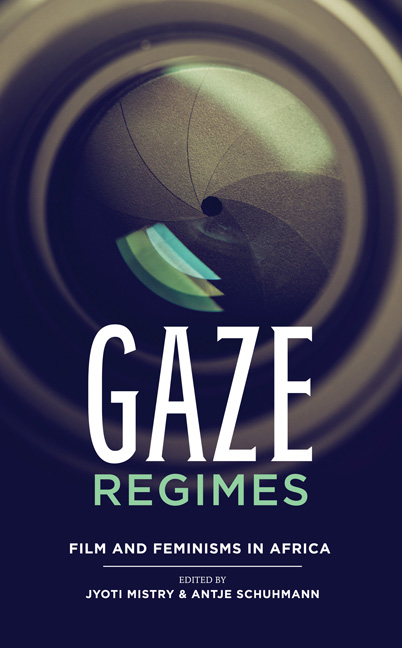Book contents
- Frontmatter
- Contents
- Acknowledgements
- Foreword: Goethe-Institut sub-Saharan Africa
- Introduction: By way of context and content
- 1 African Women in Cinema: An overview
- 2 ‘I am a feminist only in secret’
- 3 Staged Authenticity: Femininity in photography and film
- 4 ‘Power is in your own hands’: Why Jihan El-Tahri does not like movements
- 5 Aftermath – A focus on collective trauma
- 6 Shooting Violence and Trauma: Traversing visual and social topographies in Zanele Muholi's work
- 7 Puk Nini – A Filmic Instruction in Seduction: Exploring class and sexuality in gender relations
- 8 I am Saartjie Baartman
- 9 Filmmaking at the Margins of a Community: On co-producing Elelwani
- 10 On Collective Practice and Collected Reflections
- 11 ‘Cinema of resistance’
- 12 Dark and Personal
- 13 ‘Change? This might mean to shove a few men out’
- 14 Barakat! means Enough!
- 15 ‘Women, use the gaze to change reality’
- 16 Post-colonial Film Collaboration and Festival Politics
- 17 Tsitsi Dangarembga: A manifesto
- Acronyms and Abbreviations
- List of Contributors
- Filmography
- Index
Introduction: By way of context and content
Published online by Cambridge University Press: 20 April 2018
- Frontmatter
- Contents
- Acknowledgements
- Foreword: Goethe-Institut sub-Saharan Africa
- Introduction: By way of context and content
- 1 African Women in Cinema: An overview
- 2 ‘I am a feminist only in secret’
- 3 Staged Authenticity: Femininity in photography and film
- 4 ‘Power is in your own hands’: Why Jihan El-Tahri does not like movements
- 5 Aftermath – A focus on collective trauma
- 6 Shooting Violence and Trauma: Traversing visual and social topographies in Zanele Muholi's work
- 7 Puk Nini – A Filmic Instruction in Seduction: Exploring class and sexuality in gender relations
- 8 I am Saartjie Baartman
- 9 Filmmaking at the Margins of a Community: On co-producing Elelwani
- 10 On Collective Practice and Collected Reflections
- 11 ‘Cinema of resistance’
- 12 Dark and Personal
- 13 ‘Change? This might mean to shove a few men out’
- 14 Barakat! means Enough!
- 15 ‘Women, use the gaze to change reality’
- 16 Post-colonial Film Collaboration and Festival Politics
- 17 Tsitsi Dangarembga: A manifesto
- Acronyms and Abbreviations
- List of Contributors
- Filmography
- Index
Summary
The initial impetus for this book was to collect, archive and document the very disparate stories that emerged from a unique gathering of women all working in and with film, who came to Johannesburg, South Africa, in September 2010 from different parts of the African continent and from Germany, and met at the Goethe-Institut. The occasion was the ARTSWork Platform: Meeting of African Women Filmmakers. At first sight, the context for a dialogue between a German cultural institution, invited participants from Germany and film practitioners from all over Africa was an obvious axis through which the meeting should be mediated. However, it turned out very differently. We soon realised that this was only a starting point. The direction and breadth of the views and opinions expressed, and the workshop topics and the discussions that arose out of these sessions, saw a far more complex web emerging than anyone had anticipated – of co-dependencies and inter-relationships on the African continent, where national similarities were shared and divides interrogated, all against the rich landscape of film, festivals, feminism and funding politics.
ARTSWork (2010) was the spark for a series of engagements that would take place over the following two years, on occasion facilitated through other Goethe-Institut events in Johannesburg, such as the ‘Uber (w)unden (Art in Troubled Times)’ conference (September 2011), but also at other events that were ripe with opportunities for film practitioners to meet in a single place, such as the Durban International Film Festival (DIFF) in 2010.
There were multiple forms of simultaneous conversation taking place among women – and also some men – at different times, in formal and informal spaces, on planned and unplanned occasions, where various people met, exchanged, disagreed, shared and collaborated. Some exchanges were once-off conversations, some had to be revisited and some are still ongoing. The common thread was that all of the participants were active in one or several aspects of filmmaking.
It is almost a cliche to say that women need to tell their own stories, that women's voices need to be heard, that Africa has numerous stories and experiences that have to be shown. Yet the cliche holds a kernel of truth. We would add: these stories and experiences not only need to be shown, but to be shown by women, on their own terms.
Information
- Type
- Chapter
- Information
- Gaze RegimesFilm and feminisms in Africa, pp. ix - xxxivPublisher: Wits University PressPrint publication year: 2015
